|
|
|
Sort Order |
|
|
|
Items / Page
|
|
|
|
|
|
|
| Srl | Item |
| 1 |
ID:
074552
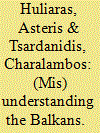

|
|
|
|
|
| Publication |
2006.
|
| Summary/Abstract |
For most Greeks, neighbouring countries like Yugoslavia, Bulgaria, Romania and Albania formed a terra incognita for almost half a century since the end of the Second World War. In the early 1990s communism collapsed in all four countries and despite the three bloody wars that followed the break-up of Yugoslavia, information, goods and people crossed Balkan boundaries in unprecedented speed. The paper examines three geopolitical codes about the Balkans that successively dominated Greek views and policies in the last fifteen years: the idea of a menacing 'muslim arc', the image of the Balkans as a Greek 'natural hinterland' and the idea of the Balkans as an undisputed part of Europe. All these geopolitical ideas were introduced by the Greek political elite and influenced decisively both Greek foreign policy and public attitudes for about half a decade each.
|
|
|
|
|
|
|
|
|
|
|
|
|
|
|
|
| 2 |
ID:
120790
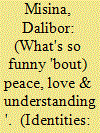

|
|
|
|
|
| Publication |
2013.
|
| Summary/Abstract |
The article examines current rock culture in the Balkans as a potential vehicle for rebuilding the broken sociocultural bonds between the different post-Yugoslav societies and for creating a constructive cultural space for articulating new forms of civic and post-nationalist identities. The argument offered is that, after the sociocultural exile during the war years, rock culture in the post-conflict Balkans has considerable potential to establish itself as a popular-cultural force of 'utopian transcendence' of the current ethno-nationalist sociopolitical moment, and as a catalyst of the new post-Yugoslav spirit of openness, tolerance and peaceful coexistence.
|
|
|
|
|
|
|
|
|
|
|
|
|
|
|
|
| 3 |
ID:
169520
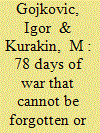

|
|
|
|
|
| Summary/Abstract |
IT WAS WEDNESDAY, March 24, 1999. At eight o'clock in the evening, the first NATO shells fell on military and civilian facilities in Belgrade, Pristina, and Nis. The NATO operation against Yugoslavia, officially codenamed "Allied Force," had begun. Meanwhile, the U.S. Armed Forces' involvement in the NATO operation was codenamed "Noble Anvil," commonly called "Merciful Angel" in Serbia.
|
|
|
|
|
|
|
|
|
|
|
|
|
|
|
|
| 4 |
ID:
055045
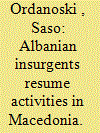

|
|
|
| 5 |
ID:
183409
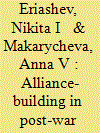

|
|
|
|
|
| Summary/Abstract |
Although great powers may forge ad hoc coalitions to attain their short-
term goals, this does not diminish the role of long-term strategic alliances.
The alliance theory has long become a separate strand of IR. However,
most scholars have focused more on external rather than internal threats
to account for alliance choices. The authors review the existing literature
on the formation of alliances and, shifting the focus to the struggle for
power between internal political actors, propose a theory that explains the formation of asymmetric alliances. By extending support to friendly
political groups, great powers can build alliances with those countries
where the elites are facing formidable opponents. On the contrary, leaders
who rule unchallenged have little incentive to rely on external patrons.
The article examines the cases of postwar Italy and Yugoslavia to test
the proposed hypotheses. The conclusions drawn from the analysis help
formulate recommendations that can be used by Russia in its current
strategic environment.
|
|
|
|
|
|
|
|
|
|
|
|
|
|
|
|
| 6 |
ID:
171095


|
|
|
|
|
| Summary/Abstract |
[T]he historical record remains bitterly contested in the former Yugoslav lands, and none of the tribunal's findings has promoted reconciliation.
|
|
|
|
|
|
|
|
|
|
|
|
|
|
|
|
| 7 |
ID:
130239
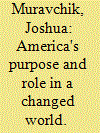

|
|
|
|
|
| Publication |
2014.
|
| Summary/Abstract |
Almost every war that America has fought since the beginning of the twentieth century was a war America had determined to avoid. We were neutral in World War I?.?.?.?until unlimited submarine warfare against our trans-Atlantic shipping became intolerable. We resisted entering World War II until Pearl Harbor. We defined the Korean peninsula as lying outside our "defense perimeter," as our secretary of state declared in 1950, a few months before North Korea attacked South Korea and we leapt into the fray. A few years later, we rebuffed French appeals for support in Vietnam in order to avoid involving ourselves in that distant country which was soon to become the venue of our longest war and greatest defeat. In 1990, our ambassador to Iraq explained to Saddam Hussein that Washington had "no opinion on?.?.?.?your border disagreement with Kuwait," which he took as encouragement to swallow his small neighbor, forcing a half million Americans to travel around the world to force him to disgorge it. A year after that, our secretary of state quipped about the violent disintegration of Yugoslavia that "we have no dog in that fight," a sentiment echoed by his successor, of the opposite party, who, demonstrating his virtuosity at geography, observed that that country was "a long way from home" in a place where we lacked "vital interests"-all this not long before we sent our air force to bomb Serbia into ceasing its attacks on Bosnia and then bombed it again a few years later until it coughed up Kosovo.
|
|
|
|
|
|
|
|
|
|
|
|
|
|
|
|
| 8 |
ID:
108248
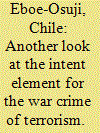

|
|
|
|
|
| Publication |
2011.
|
| Summary/Abstract |
The modern basis of the war crime of terrorism may be found in the terms of article 51(2) of Additional Protocol I (1977) to the Geneva Conventions of 1949, replicated in article 13(2) of Additional Protocol II. The provision forbids attacks carried out for the 'primary purpose of spreading terror' among a civilian population. In view of this provision, the judges of the International Criminal Tribunal for the former Yugoslavia have pronounced terrorism to be a crime of 'specific intent'. In an extension of this reasoning, a Trial Chamber of the Special Court for Sierra Leone has recently held that the crimes of enslavement and militarization of children do not qualify as terrorism, because they were not found to have been committed for the 'primary purpose of spreading terror'. The aim of this paper is to examine the correctness and limits of the proposition that terrorism is a crime of specific intent. In the context of that inquiry, the Rome Statute is examined for what it is able to contribute to the discussion.
|
|
|
|
|
|
|
|
|
|
|
|
|
|
|
|
| 9 |
ID:
086335
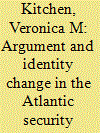

|
|
|
|
|
| Publication |
2009.
|
| Summary/Abstract |
The Atlantic community shares more than just dependable expectations of peaceful change. Its members also share a reflexive political community they sense is worth preserving and a view that their security is intertwined. Existing accounts of the Atlantic security community have identified the importance of renewed emphasis on common values as a factor in preserving and expanding the security community after the Cold War. But, debates at the end of the Cold War also turned on the question of what the allies would do together and what responsibilities they had to each other and to other states. This article outlines a discursive framework and a set of rhetorical strategies used by members of the Atlantic community that explain how they worked to maintain and change their community during debates about their mandate for cooperation. This framework is then applied to the Atlantic community's debates over common action during the Yugoslav wars.
|
|
|
|
|
|
|
|
|
|
|
|
|
|
|
|
| 10 |
ID:
109290
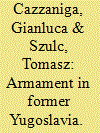

|
|
|
| 11 |
ID:
128987
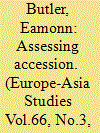

|
|
|
|
|
| Publication |
2014.
|
| Summary/Abstract |
On 1 May 2014, the European Union (EU) celebrated the tenth anniversary of the accession of ten member states-Cyprus, Czech Republic, Estonia, Hungary, Latvia, Lithuania, Malta, Poland, Slovakia and Slovenia. Of these ten new members, eight were Central and East European (CEE) countries that had, for most of the twentieth century, been governed by communist regimes either as republics of the Soviet Union (Latvia, Lithuania and Estonia), satellite states of the Soviet Union (Poland, Hungary, Czech Republic, Slovakia) or as a constituent republic of Yugoslavia (Slovenia). In the subsequent ten years three additional post-communist countries have acceded to the EU (Romania and Bulgaria in 2007 and Croatia in 2013). Commenting on the 2004 EU accession of the first eight former communist countries, the then Irish Prime Minister and President of the European Council, Bertie Ahern, wrote that there was
a particular historical resonance as eight of the former communist countries in the east have emerged from the shadows of the Iron Curtain to join us in working for common goals and for mutual benefit. The artificial divisions, which have blighted our continent's history for so long, are finally being laid to rest.1
|
|
|
|
|
|
|
|
|
|
|
|
|
|
|
|
| 12 |
ID:
152226
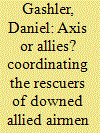

|
|
|
|
|
| Summary/Abstract |
During World War II, American Army Air Forces commanders cooperated with Communist Partisans and their Chetnik enemies to rescue thousands of downed airmen from occupied Yugoslavia. American intelligence realized that a British-exclusive alliance with the Partisans hampered the ability to rescue as many airmen as possible. US commanders were unwilling to divert significant resources to the Balkans but instead gambled that the Chetniks might be willing to cooperate with rescuers as well. Air Force commanders were involved just enough to ensure that hundreds evaded capture, without involving themselves in a conflict where Americans had no national interest. These commanders showed the value of pragmatic cooperation over grand, ideological alliance.
|
|
|
|
|
|
|
|
|
|
|
|
|
|
|
|
| 13 |
ID:
169521
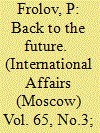

|
|
|
|
|
| Summary/Abstract |
I only wished to say that ideas that have great results are always simple ones. My whole idea is that if vicious people are united and constitute a power, then honest folk must do the same. Now that's simple enough.
|
|
|
|
|
|
|
|
|
|
|
|
|
|
|
|
| 14 |
ID:
100699
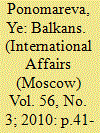

|
|
|
|
|
| Publication |
2010.
|
| Summary/Abstract |
THE "MANAGEABLE CHAOS" came to the Balkans twenty years ago in the form of ethnoconfessional conflicts and wars, and continued fragmentation of what had been Yugoslavia not so long before. The peninsula was turned into a testing ground of regime change technologies known as color revolutions with the absolute majority of its population living in poverty and the military and political presence of third forces ensured by the EU and UN peacekeepers and NATO. This is a natural outcome of the development of the world system of capitalism. Why did the Balkans become a zone of instability/chaos and permanent crisis? The answer to this question is obvious.
|
|
|
|
|
|
|
|
|
|
|
|
|
|
|
|
| 15 |
ID:
058445
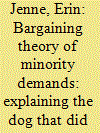

|
|
|
| 16 |
ID:
148391
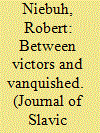

|
|
|
|
|
| Summary/Abstract |
When Yugoslav strongman Josip Broz Tito secured power at the end of World War II, he used violence as a key mechanism in that quest. Owing to the contested nature of politics in Yugoslav territories, these acts of violence were diverse and focused on a number of different peoples, including prisoners of war. While scholarship has covered Tito’s use of viciousness at places such as Bleiburg, this article would like to suggest that violence was not ubiquitous. Documents at the Archive of Yugoslavia tell a story of how a small group of German prisoners of war fared under Tito’s regime, which I argue show that ideology trumped other aspects of early postwar politics. Various documents focus on Wehrmacht Battalion 999 and how this episode should inform our broader understanding of violence, ideology, and political control in the aftermath of World War II.
|
|
|
|
|
|
|
|
|
|
|
|
|
|
|
|
| 17 |
ID:
016073
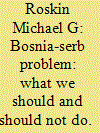

|
|
|
|
|
| Publication |
Winter 1992-93.
|
| Description |
21-32
|
|
|
|
|
|
|
|
|
|
|
|
|
|
|
|
| 18 |
ID:
105247
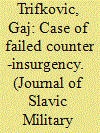

|
|
|
|
|
| Publication |
2011.
|
| Summary/Abstract |
This article examines operations "Weiss" and "Schwarz," two of the largest anti-guerrilla sweeps conducted by the German Wehrmacht during the entire Second World War. Four reinforced divisions with ca. 65,000 German soldiers and up to 100 aircraft took part in what is regarded as the most ferocious fighting of the whole war in Yugoslavia. Although conducted with maximum effort in material terms, they were doomed to failure because of the Third Reich's neglect of guerrilla warfare and the resulting lack of a sound counter-insurgency doctrine. Remarkably, operations "Weiss" and "Schwarz" are almost unknown to the public in the West, despite their sheer size. As the founding myths of socialist Yugoslavia, they were extensively written about, almost always from a Partisan perspective. This is the first article to describe the events from the German point of view, and to analyze the Wehrmacht's conduct of these operations in some depth. With the ongoing COIN campaigns in Iraq and Afghanistan, examining the lessons from the past can prove enlightening.
|
|
|
|
|
|
|
|
|
|
|
|
|
|
|
|
| 19 |
ID:
162766
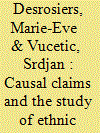

|
|
|
|
|
| Summary/Abstract |
What does causation mean in conflict studies? Using a sample of published qualitative, article-length studies on the Rwandan and Yugoslav wars, this article finds a lack of reflexivity over causal claims in scholarship on conflict. Causal language is not as pervasive as expected, asserted cause-effect relationships are rarely fully explicated, and scholars under-explore their causal assumptions. Considering that ideas on causation necessarily condition explanations of conflict, including “ethnic” conflict, this is a major research issue. While there exists a lively debate between different causal narratives regarding the onset of conflict—with studies alternatively stressing “attitudes,” “conditions,” or both—it stops short of addressing issues at the deeper level of causal understandings. For the most part, studies subscribe to the search for empirical generalization, thus limiting attendant debates to a single model of causation. These findings indicate that conflict studies literature would benefit from greater reflexivity and pluralism with regards to causation and paying more attention to philosophical debates on the subject. The article provides a basic outline of this reflexive agenda.
|
|
|
|
|
|
|
|
|
|
|
|
|
|
|
|
| 20 |
ID:
114717
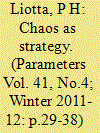

|
|
|
|
|
|
|
|